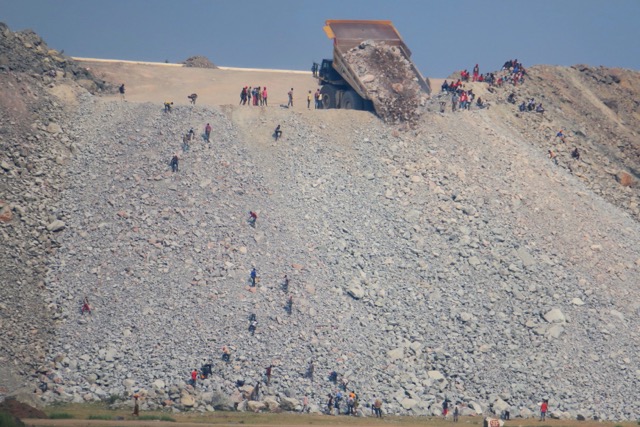Mine Must Stop using Police and Abusive Grievance Mechanism: MiningWatch releases report to United Nations Working Group on the Use of Mercenaries
Yesterday news outlets in several countries simultaneously released the results of investigations by a consortium of journalists into human rights and environmental abuses at Barrick Gold’s North Mara gold mine in Tanzania.[1] This exposé by, among others, Canada’s Toronto Star, UK’s Guardian, and Switzerland’s Tagesanzeiger confirm findings of six years of investigations, reported on yearly by MiningWatch Canada, into assaults on men, women and children by the mine’s private security and by police contracted by the mine.
The consortium also highlights attacks on journalists who have tried to report on human rights abuses at the mine, and exposes the way the gold from this mine is refined in India and Switzerland before being sold to, among others, international electronic companies.
Systemic Security Abuses at Barrick Gold Mines
The security related human rights abuses at Barrick’s North Mara mine are not unique, however, as very similar assaults by public and private mine security against local indigenous men, women and children at Barrick’s Porgera gold mine[2] in the remote highlands of Papua New Guinea have been reported on since 2006 by MiningWatch Canada, the Harvard Human Rights Clinic, and the Columbia University Human Rights Clinic.
At both the North Mara mine in Tanzania and the Porgera mine in Papua New Guinea, the mines’ security arrangements include the use of secret agreements between the mines and the countries’ police forces. MiningWatch was able to obtain the 2010 and 2014 agreements (2010, 2014) between the North Mara Gold Mine and Tanzanian police, but the current agreement is not a public document. The agreement between the Porgera Joint Venture mine and Papua New Guinea police forces has never been disclosed.
Also, at both mines, victims of assaults by mine security have been processed through grievance mechanisms set up by the mines themselves, which have deepened harm by rejecting many cases, providing inequitable remedy to others, and in many cases requiring the victims to sign waivers preventing them from taking – or even participating in – legal action.
In March of this year, MiningWatch documented the history of security related human rights abuses at both Barrick mines in a 20-page report to the United Nations Working Group on the Use of Mercenaries and provided recommendations including that: companies and governments should not contract police to serve as an ongoing component of mine security; companies need to take all necessary steps to ensure that mine security who are accused of serious human rights abuses are turned over to the police for investigation and possible prosecution; companies and governments should make public any existing agreements that authorize the use of police as a component of mine security.
